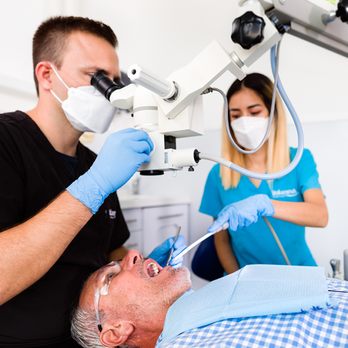Dr. Esteban Barragán was born into a deeply rooted in dentistry family, as he grew up observing his father, a respected orthodontist, in action. His journey in the sphere began at Universidad Latinoamericana in Mexico City, where he pursued his dental education. Driven by a thirst for knowledge and excellence, he took his expertise further through postgraduate training in Oral Surgery, Implantology, and Prosthetic Dentistry at the renowne Universitat Internacional de Catalunya in Barcelona, Spain. It was during this time that he also dedicated to groundbreaking research in bone regeneration biomaterials and surgical techniques, culminating in the completion of his PhD research.
Remarkably, at the young age of 27, Dr. Barragán emerged as an influential international speaker and key opinion leader in the ambit of bone regeneration. His fluency in Spanish, English, Italian, and French allows him to connect with diverse audiences and collaborate on a global scale.
Beyond his professional accomplishments, Dr. Barragán finds solace and joy in spending quality time with his family. During his leisure time, he indulges in the therapeutic art of gardening, takes pleasure in preparing pizza from scratch, and savors the flavors of grilled cuisine.
Dr. Barragán truly embodies the adage “Do what you love so you’ll never need to work,” as his passion for dentistry and zest for life intertwine harmoniously in his projects.
Dental Implants:
Our surgeon, Dr. Esteban Barragán has more than 15 years of experience and has placed at least 2,000 implants during the last years.
Each treatment is different because we´re sure each patient has special needs to have a healthy and natural smile.
Dental Implants are known as the best treatment for dental restoration with patients that are missing teeth or will need extractions. Dental implants will let you have a natural smile with a strong bite.
This treatment is a permanent solution because it is not removable so you will enjoy speaking, laughing and eating everything you want without worries about thinking they will fall at any moment.
We use premium brands of titanium Dental Implants which are corrosion resistant and biocompatible, have the inherent ability to osseointegrate, where new bone is laid down directly on the implant surface. This makes for a very stable bond between the implant and surrounding bone.
After a complete x-ray evaluation made with our X Kodak 9000C where we will take panoramic x-ray and CT Scans, we offer a 3D guide for the implants placement.
This technology lets us know how your bone quality is and also know the nerves position and where we need to place the implant.
The surgeon Will have enough time to show you the x-rays, explain the treatment and solve all the questions you may have.
Your surgery will be successful because everything will be carefully planned.
What specialties can I find at Bokanova?
• General Dentistry
• Oral and Maxillofacial Surgery
• Implantology
• Endodontics
• Aesthetic Dentistry
• Oral Prosthesis and Oral Rehabilitation
• Temporomandibular Joint Disorders (TMJ)
• Pediatric Dentistry
• Orthodontics
• Periodontics
• Oral Pathology
What is the duration and procedure of an ultrasonic cleaning?
This cleaning is performed using an electric device that applies ultrasonic vibrations through a thin metal tip to remove tartar accumulated on the teeth. The ultrasonic waves emitted by the device help eliminate the tartar, while the water it expels serves to remove tartar debris and prevent the heating of the tooth and the device. Subsequently, surface polishing is carried out with the aid of state-of-the-art air polishers, eliminating stains caused by coffee, wine, tobacco, and other pigments in food.
Professional dental cleaning usually takes about 45 minutes. It is a simple and painless process, which is why regular cleanings are recommended for their multiple benefits.
What is the duration and procedure of teeth whitening?
The complete procedure usually lasts less than an hour, but it is recommended to have a regular dental cleaning before the whitening session. The procedure begins with a brief preparation to cover the lips and gums, exposing the teeth. Then, the dentist or dental assistant applies hydrogen peroxide or carbamide peroxide whitening gel, which works in conjunction with LED light to penetrate the tooth and break down stains and discoloration. The gel is left on for 15 minutes while the light is activated. During this time, you can relax, watch TV, or listen to music.
The gel is applied during three 15-minute sessions with the light activated, for a total treatment time of 45 minutes. People with anxiety or a strong gag reflex may have difficulty completing the entire procedure. Immediately after, a fluoride gel-paste is applied to the teeth to reduce sensitivity.
What care should I take after teeth whitening?
Teeth are susceptible to capturing pigments that can stain the enamel again. To prevent this, our experts in teeth whitening at Bokanova recommend avoiding the consumption of colored or dark-colored foods and beverages. In particular, condiments, berries, wine, sauces, and coffee should be avoided.
Similarly, due to the high sensitivity that teeth may experience after a teeth whitening treatment, it is essential to limit the intake of citrus fruits and very cold beverages.
Fortunately, the period during which you have to follow these care measures is very brief. Once the period is over, you will be delighted with the result. If it is impossible for you to exclude these foods and beverages from your diet, try at least to reduce their consumption.
What is better, resin or veneers?
Ceramic dental veneers are a more durable option than resin veneers because they do not change color, lose shine, or wear out. However, since they are fabricated by a laboratory technician, their cost is higher than resin veneers.
How long do porcelain veneers last?
Based on this, it should be mentioned that resin veneers usually last between 3 and 5 years, porcelain veneers between 10 and 15 years, and Lumineers can last up to 30 years, provided they are properly cared for.
Which is better, a dental veneer or a dental crown?
Both options allow for the improvement of imperfections in your teeth and the creation of a beautiful smile by modifying their shape, color, size, and position. However, veneers are a more conservative treatment as they involve minimal tooth structure removal.
On the other hand, dental crowns are recommended in cases where the tooth has a cavity that is too large for a filling, if the tooth is worn, weakened, cracked, or has undergone a root canal treatment, which increases its fragility.
Ultimately, the choice between a veneer and a dental crown depends on the specific condition of your teeth and the desired outcome. It is best to consult with a dentist who can evaluate your oral health and provide personalized recommendations based on your needs.
Which is better, a root canal treatment or an extraction?
The goal of a root canal treatment is to save the tooth, while an extraction is performed when the tooth cannot be saved. The best option depends on the specific condition of your tooth and any previous infection it may have.
In general, dentists will try to save a natural tooth through root canal treatment whenever possible, as it helps preserve the natural structure and function of the tooth. However, there are cases where an extraction may be necessary, such as when the tooth is severely decayed, damaged, or infected beyond repair.
Ultimately, the decision between a root canal treatment and an extraction depends on the individual circumstances and the professional judgment of your dentist. It is recommended to consult with a dentist who can assess your specific situation and provide appropriate advice and treatment options.
Which is more painful, an implant or an extraction?
The fear of the dentist continues to be one of the main reasons why many patients do not replace their missing teeth. At Bokanova, we have been placing Dental Implants for over 18 years using non-surgical and minimally invasive procedures, depending on the case, despite the belief held by many that it is a complicated and painful procedure. Thanks to the new technologies in our equipment and the use of the most advanced surgical techniques, combined with our personalized and close approach, we ensure that fear is not a cause for having poor oral health.
It is during the postoperative stages that the patient may experience some discomfort in the treated area. This discomfort is usually less than that experienced during a tooth extraction, and we have developed protocols to accompany you throughout the process and make your postoperative period as comfortable as possible.
What is a bone graft and what is it used for?
Bone grafts, typically a minor surgical procedure performed in a dental office or during an extraction, are used to create new bone in a location where a tooth used to be. They are commonly performed to achieve better results for dental implant placement.
What is an implant?
A dental implant is an artificial tooth root used to replace a missing tooth. It is typically threaded in shape and made of biocompatible materials (such as titanium or zirconia) that do not cause rejection reactions and allow it to fuse with the bone.
What happens if I don't get a dental implant in time?
It is very important to replace missing teeth because if we don't, the adjacent teeth tend to move in an attempt to fill the space of the missing tooth.
At Bokanova, we want to raise awareness about the importance of replacing a missing tooth as its consequences can be serious in the long term. That's why we always recommend replacing the missing tooth with dental implants without waiting too long.
If a long period of time passes, it may be necessary to perform advanced procedures such as bone grafts before the dental implant can be placed to ensure the success of the procedure.
What is the procedure for placing a dental implant?
Fear of dental implants is common, but understanding the procedure can help dispel your fears and give you the confidence needed to restore your smile. Below, we explain in detail how the dental implant process works.
1. Initial evaluation Before starting the dental implant treatment, at Bokanova, we conduct a thorough evaluation to determine if you are a suitable candidate for dental implants. This includes reviewing your medical history, performing intraoral examinations, taking intraoral radiographs, and 3D tomography or CBCT scans of the area to be treated.
2. Treatment planning Once it has been confirmed that you are a candidate for dental implants, our specialist will develop a personalized treatment plan and explain it to you, addressing all your doubts. This plan will detail the specific stages of the procedure, as well as the estimated time to complete each phase.
3. Tooth extraction (if necessary) If you have damaged or decayed teeth that need to be extracted before placing the implants, your dentist will safely and effectively remove them. In some cases, immediate implants can be placed on the same day as the extraction.
4. Implant placement The implant placement process involves inserting a titanium or zirconia screw into the jawbone or maxilla. This screw acts as the artificial root of the tooth and provides a solid foundation for the dental crown. The surgery is performed under local anesthesia to ensure you don't feel any pain during the procedure.
5. Osteointegration Period After the implant is placed, a period of time is required for the jawbone to fuse with the titanium screw in a process called osseointegration. This process can take between three and six months, depending on your regenerative capacity and whether any bone regeneration techniques have been used in the area.
6. Placement of the Abutment and Crown Once the implant has fully fused with the bone, your dentist will place a component called an abutment onto the implant. The abutment serves as a connection between the implant and the dental crown. Finally, the dental crown, which is the visible part of the tooth, is placed onto the abutment.
By understanding each stage of the dental implant procedure, you can feel more confident about what the treatment entails and approach it with a positive attitude. Additionally, remember that you can always discuss your concerns with our specialists, who will be happy to provide you with additional information and emotional support throughout the process.
How long does a dental implant surgery take?
The duration of a surgical procedure in an implant treatment can range from 30 to 45 minutes up to about three hours. The determining factor is the number of dental implants that need to be placed.
What type of anesthesia is used during implant placement?
Depending on the type of surgery and the individual needs of our patients, we can use anything from simple local anesthesia to conscious sedation with nitrous oxide gas or conscious sedation with intravenous anesthesia. These procedures are performed by our specialized Anesthesiology physician using the most advanced monitoring equipment to ensure your safety during the procedure.





